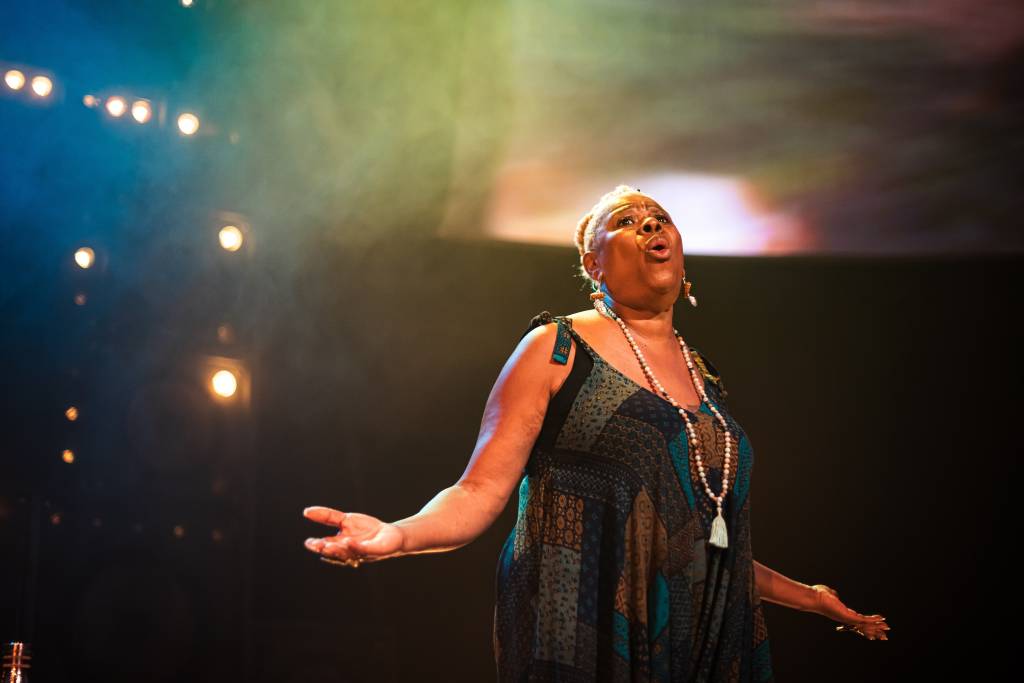 |
| Photo: Charley Williams |
Through internet forums, surveys and interviewing menopausal women, Kat discovered that their initial feelings of shame, isolation and ignorance were shared by countless others. Despite being an experience shared by half of humanity, due to systemic ageism and misogyny, menopause is widely seen as something embarrassing and shameful. If it is mentioned publicly at all, then it is often the punchline of misogynistic jokes. Dry Season was created in an attempt to counter this.
I caught up with Kat to learn more about the show and what it’s like to create poetry on a mass scale.
 |
| Dry Season. Photo: Suzy Corker |
Q&A with Kat Lyons
Hi Kat, thanks for talking with us about your new spoken word theatre show Dry Season. It was inspired by your own experience: what can you tell us about that?
I’ve always been a feminist and thought I was educated about my health, but being diagnosed with menopause at 38 totally side-swiped me – I had no idea what was going on, what it could do and what to expect, and I certainly didn’t expect it to happen so early! When I started researching menopause after my diagnosis, I discovered all these other women in online forums who were all saying how alone they felt, how nobody understood what was happening with them and how they didn’t feel able to talk about it with anyone. It made me think – well, poets are good at talking about stuff so maybe I should do something. So I started writing and interviewing people and it just grew into this!
Has it been a cathartic experience bringing the story to life on stage, or has it been challenging to relive it?
I use my own story and experiences to explore ideas that resonate with other people too, such as questioning the pathway and expectations laid out for us, and society’s ideas of how we should act. It’s still very personal though, and although I incorporated other people’s experiences it’s still all about me which made me feel very vulnerable when I first started performing it. But having people come up afterwards and say they saw themselves reflected in parts of the show has been amazing, and made me realise how valuable it is to see your experiences reflected, especially if they’ve previously been a source of shame.
Menopause is often seen as a taboo subject, how important are shows like Dry Season in changing that?
I think it’s very important – menopause is a massive change in the lives of half the human population – it is ridiculous that it’s not spoken about more, and it would be strange if we didn’t use art to explore it in the same way we explore other aspects of our lives. The more it’s spoken about in public (which includes making shows about it) then the less taboo it becomes and the more normalised it will be to discuss it. We need to get rid of the shame around menopause because all it’s doing is making life harder for 1,000s of people every day.
You’re a poet and theatre maker, and have published a poetry collection Love Beneath the Nails, do you approach poetry and theatre in different ways?
This is my debut show so I’ve been learning as I go along. A lot of it is a matter of scale. In a poem you have to create a narrative arc over just one page, whereas in a show that happens over the course of a whole hour and you need to introduce different elements and pacing in order to sustain interest. It was also a challenge learning to memorise such a long piece as there are around 10,000 words in Dry Season! But the basic elements of creating something remain the same, and as I make spoken word theatre I’m able to start with lots of separate poems and work out a way of constructing a larger structure within which I can hang them and link them up to make sense.
You’re currently Bristol City Poet; how has that experience been?
It’s been great! Telling the story of a whole city is a big challenge, and I’ll never have time for all the things I want to explore, but I’ve got some great commissions in the pipeline and can’t wait to get stuck into the archives and finding out all about local history and stories of people who lived here.
Finally, how would you describe Dry Season to someone considering buying a ticket for the show?
It’s a spoken word theatre show, which in this case means it’s a cross between performance poetry, monologue and storytelling. It’s very personal, and deals with a very difficult period in my life, but I approach the subject in an irreverent way, so there’s a fair amount of dry dark humour sprinkled around in it too.











.png)



